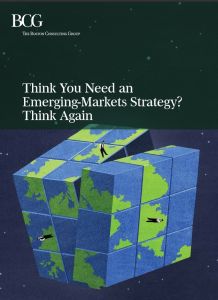Join getAbstract to access the summary!

Join getAbstract to access the summary!
Dinesh Khanna, Alexander Roos, Enrique Rueda-Sabater, David Michael and Janika Gauselmann
Think You Need an Emerging-Markets Strategy? Think Again
Boston Consulting Group, 2015
What's inside?
With the lines between emerging and developed markets blurring, companies must reassess their global strategies.
Recommendation
At one time, the line between the advanced and emerging markets was fairly distinct: Wealth and higher incomes distinguished the former, and lower incomes and faster economic growth characterized the latter. But that line has become blurred, according to this perceptive analysis from Boston Consulting Group professionals, and these shifting trends call for fresh corporate strategies. getAbstract recommends this timely article to executives responsible for developing those strategies, as well as to investors seeking insights into the promising economies of tomorrow.
Summary
About the Authors
Dinesh Khanna et al. are professionals with the Boston Consulting Group.
























Comment on this summary